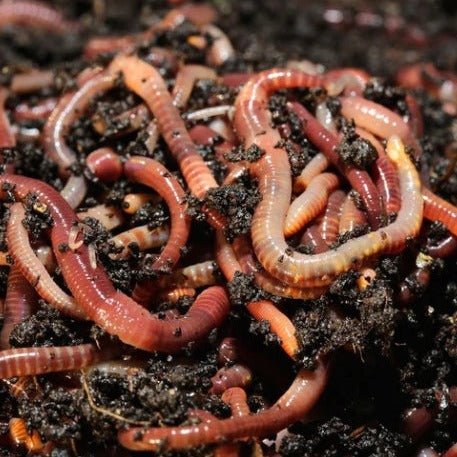Red Wiggler Express: Reliable Bait for a Productive Fishing Day
Red Wiggler Express: Reliable Bait for a Productive Fishing Day
Blog Article
Unlock the Keys of Red Wigglers: Your Overview to Composting Success
The combination of red wigglers into composting techniques provides a considerable opportunity for boosting soil health and advertising sustainability. Comprehending their needs and actions is important for enhancing their potential, from establishing up a suitable worm bin to feeding them the ideal materials.

What Are Red Wigglers?
(Red Wiggler Express)Red wigglers, medically referred to as Eisenia fetida, are a species of earthworm largely used in composting due to their impressive capability to break down natural matter successfully. These worms are defined by their reddish-brown coloration and a segmented body, generally gauging between 3 to 4 inches in size. Unlike other earthworm varieties, red wigglers flourish in abundant, organic settings, making them optimal for vermicomposting systems.
Belonging To The United States And copyright, they are commonly discovered in decomposing leaves and compost heap, where they play an important duty in nutrient recycling. Their adaptation to residing in a moist, cardio setting enables them to consume huge quantities of natural waste, simplifying into nutrient-rich spreadings that improve soil wellness.
Red wigglers replicate swiftly, with a solitary worm qualified of generating several cocoons each week, each containing several hatchlings. Comprehending the biology and habits of red wigglers is necessary for optimizing their capacity in composting applications.
Advantages of Making Use Of Red Wigglers
Utilizing the power of red wigglers in composting uses many benefits that boost dirt wellness and advertise lasting waste administration. These exceptional microorganisms successfully damage down natural issue, changing cooking area scraps and backyard waste right into nutrient-rich vermicompost. This ended up item is remarkably helpful for plant development, as it enhances soil structure, enhances wetness retention, and enhances nutrient availability.

(Red Wiggler Express)Furthermore, the presence of red wigglers in your composting system can accelerate the composting procedure, creating premium garden compost in a portion of the time compared to traditional methods. The spreadings created by these worms are also including helpful bacteria that further improve the soil environment.
Establishing Your Worm Bin
Developing a reliable worm bin is a simple process that can considerably boost your composting efforts. Worm bins can be made from plastic storage containers, wooden boxes, or commercially offered worm containers.
Following, prepare the bedding material, which offers as the worms' environment. A mix of shredded newspaper, cardboard, and coconut coir works well, giving a comfortable atmosphere for the worms.

Feeding Your Red Wigglers
To guarantee the health and productivity of your red wigglers, it is important to provide them with a well balanced diet plan that satisfies their nutritional demands. Red wigglers prosper on a diverse array of natural materials, which not only provide required nutrients but additionally promote efficient composting.
Beginning by integrating kitchen scraps such as veggie peels, fruit cores, and coffee grounds. Avoid citrus fruits, onions, and garlic, as these can be damaging to worm health. In addition, introduce shredded paper, cardboard, and completely dry leaves to produce a well-aerated environment.
Feeding regularity ought to be monitored; usually, worms can take in half their body weight in food weekly. It is crucial to prevent overfeeding, as excess food can lead to undesirable odors and draw in pests. A great practice is to add food in percentages, allowing worms to process it prior to introducing extra.
Preserving moisture degrees is also crucial; the bedding must be damp yet not soggy. Last but not least, make sure to consistently inspect the temperature level and pH degrees of the bin to guarantee an optimum atmosphere for your red wigglers, inevitably enhancing their composting efficiency.
Harvesting and Making Use Of Garden Compost
A successful composting process with red wigglers finishes in the abundant, dark compost understood as vermicompost, which can considerably improve soil health and plant development. Collecting this nutrient-dense product normally happens every three to 6 months, relying on the dimension of your system and the amount of organic issue being refined.
To harvest, gently different the compost from the worms and any undecomposed products. One efficient method entails relocating the contents of the container to one side and adding fresh bed linens and food to the void, urging the worms to migrate. After a couple of days, the compost can be collected from the contrary side.
It is vital to make use of vermicompost properly to optimize its benefits. By integrating vermicompost into your horticulture routine, you not only reuse organic waste however additionally produce a growing community important source that sustains sustainable horticulture practices.
Final Thought
In recap, red wigglers act as remarkable allies in composting initiatives, changing organic waste right into nutrient-rich vermicompost (Red Wiggler Express). Their unique biological attributes and reliable waste processing abilities add considerably to lasting horticulture practices. By comprehending the ideal problems for their habitat, feeding demands, and compost harvesting strategies, gardeners can enhance soil wellness and advertise plant vitality. Embracing vermicomposting not just minimizes landfill waste however additionally cultivates a more ecologically liable strategy to horticulture and source monitoring.
Report this page